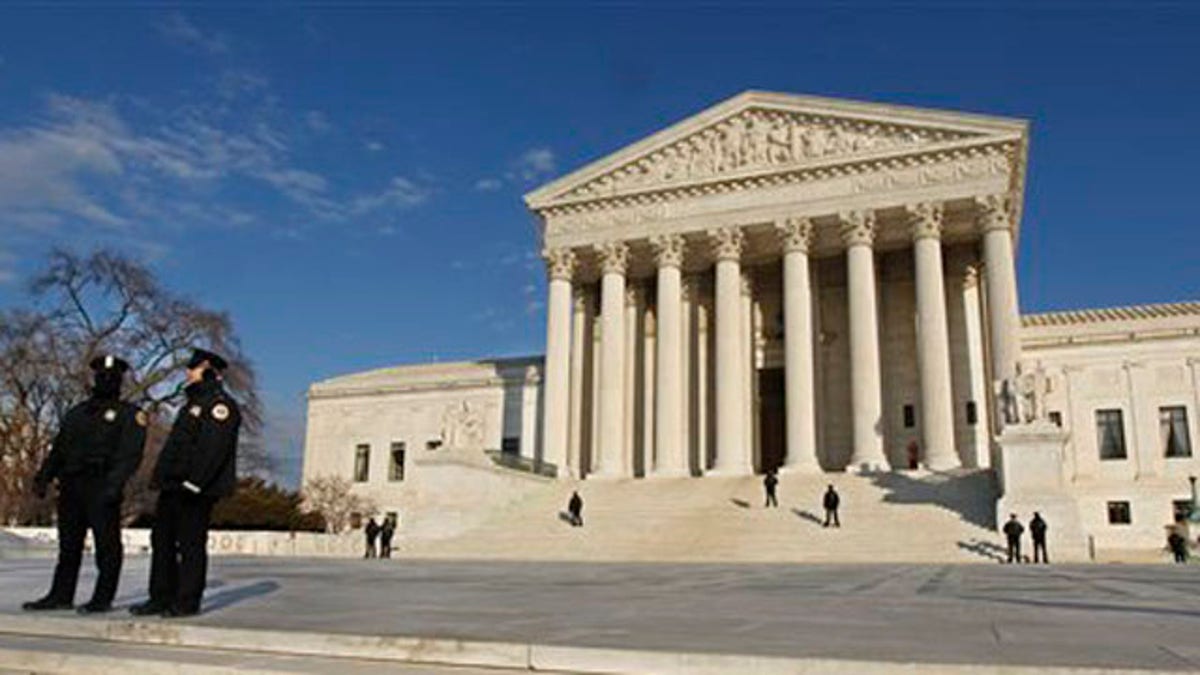
Security personnel stand guard as anti-abortion activists gather in front of the U.S. Supreme Court, in Washington, Monday, Jan. 24, 2011, during a rally against Roe v. Wade on the anniversary of the U.S. Supreme Court decision. (AP Photo/Manuel Balce Ceneta) (AP)
The Supreme Court may be sending a message to one of the country's most liberal appeals courts, unanimously overturning five consecutive cases out of the 9th Circuit in less than a week.
As the nation's biggest circuit, representing most of the western United States, it should come as no surprise that the 9th Circuit has more cases heard before the Supreme Court than any other jurisdiction -- in turn resulting in more reversals. But the latest string of rulings is unusual even for the 9th, which often is at odds with conservatives on the Supreme Court. The fact that the rulings were unanimous can be seen as a signal from on high that the circuit needs to get in line.
"That's an indication this court is way out of the mainstream," said Kent Scheidegger, legal director for the California-based Criminal Justice Legal Foundation. "They're getting impatient with them. They just keep coming back with this stuff."
The Supreme Court, in its rulings, signaled that the circuit must hew more closely to precedent and, in some cases, give more weight to state court rulings. Scheidegger said the high court used some "severe" language to get that message across.
In a Jan. 19 reversal, Supreme Court Justice Anthony Kennedy wrote that the 9th Circuit committed a "clear error" by overturning the murder conviction in the case of a Sacramento man. The Supreme Court accused the circuit of having "failed to accord the required deference" to the state court's decision -- in other words, the 9th Circuit horned in on the state's business when it shouldn't have.
Kennedy accused the circuit of demonstrating "judicial disregard" for "sound and established principles."
In that case, defendant Joshua Richter had been convicted in connection with the 1994 shooting of two men at the home of a California drug dealer. He had initially denied involvement but later claimed he went inside the home after hearing gunshots, apparently from his accomplice.
On appeal, Richter challenged his attorney's representation, claiming his counsel did not counter testimony from a blood pattern expert called by the prosecution -- that testimony had conflicted with Richter's. The state Supreme Court denied this claim. So did a federal district court judge. So did a panel on the 9th Circuit. But when a broader panel of 9th Circuit judges reviewed the appeal, they rejected the conviction on a split 7-4 ruling.
The Supreme Court ruling, though, said there was "sufficient" evidence pointing to Richter's guilt and that the state court's decision was reasonable.
That was one of three criminal cases -- one having to do with an Oregon defendant who challenged his lawyer's competence after pleading no contest to a felony murder charge, the other with California's parole system -- written by Judge Stephen Reinhardt, among the most liberal judges in the country.
"He is out on the fringe," Scheidegger said.
Reinhardt was nominated to the bench in 1979 by former President Jimmy Carter. He has since developed a reputation as one of the most left-leaning judges in America. In an interview with a California legal magazine several years ago, he conceded, "I think I was born that way." The judge has been at the forefront of several controversial decisions out of the 9th Circuit, including a 2002 opinion that ruled the Second Amendment does not guarantee an individual right to own firearms.
The judge has generated controversy more recently over his refusal to recuse himself from a panel considering California's anti-gay marriage Proposition 8 law -- Reinhardt's wife is a longtime official with the American Civil Liberties Union.
Scheidegger speculated that the Supreme Court was aiming its recent rulings not so much at Reinhardt but at the rest of the judges on the appeals court, who, he said, "need to rein him in." Scheidegger's group filed friend-of-the-court briefs, at odds with the 9th Circuit rulings, in two of the above criminal cases.
Jonathan Turley, law professor at George Washington University, said he doubts the Supreme Court is trying to single out Reinhardt, though he said there's "no question" he's one of the most liberal judges in the country. Turley said he doesn't sense a pattern in the rulings.
However, he described the court's recent activity as "corrective."
"It's clear that some of the more conservative justices tend to view the 9th Circuit with an element of unease," Turley said. "This is a very clear direction from the Supreme Court."
But it wasn't just the conservative justices voicing discontent with the 9th Circuit's opinions.
In a 9-0 opinion written by Justice Sonia Sotomayor, President Obama's first nominee, the Supreme Court ruled that a federal regulation did not require credit card companies to give holders advance notice for an interest rate increase following "delinquency or default" -- contrary to a 9th Circuit decision.
In an 8-0 opinion written by Justice Samuel Alito, the Supreme Court reversed a ruling by the 9th Circuit that challenged NASA's background checks for employees. The 9th Circuit, among other things, had ruled that a form asking prospective workers about recent illegal drug use would likely be held unconstitutional. The Supreme Court disagreed.
A representative from the 9th Circuit could not be reached for comment.
Though the Supreme Court is occasionally at odds with the 9th Court, the latest string of decisions is out of the ordinary. Judicial statistics kept by SCOTUSblog show that 9th Circuit decisions actually have a better-than-average showing before the Supreme Court. In the last session, 27 percent of its rulings were affirmed, while 60 percent were reversed. For all circuits, the reversal rate was 71 percent.





















